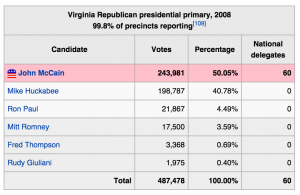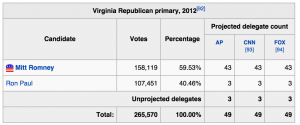As Spring rolls into Summer, Virginia Republicans find themselves debating yet again what nominating procedure to use on the state level. [read_more]
As the sides line up and offer their thoughts, we hear a lot of the same arguments we hear every year.
Excluding the brief discussion about a state convention for president in 2012, this discussion is radically different than any other convention v. primary debate. You see, at the end of the day that we vote, regardless of the form, we will not have a nominee. What State Central will decide next week is the process by which Virginia’s delegates to the national convention will be allotted to certain presidential candidate(s) for the vote at the Republican National Convention.
Some may remember the long protracted battle between Hillary Clinton and Barack Obama in 2008. It was a battle over delegates to the national convention. The term “super delegates” became part of the political lexicon as there was the possibility a group of Democrat convention delegates may enable the contest to be determined at the national convention. In 2008 and 2012 Republican campaigns were analyzing delegate counts, and McCain and Romney became the defacto nominees when they secured enough delegates to win the convention on the first ballot. Ultimately we are determining the process for assigning delegates not nominating methods which makes this discussion of primaries v. conventions a very different one. Republicans are having a convention to determine their presidential nominee just like the Democrats and just like both parties have done for decades. Virginians have to decide the process by which each/a campaign is assigned delegates.
As much as primaries are heralded as the great democratic process, in Virginia for the presidential contest, they have been the opposite. Let’s look at the results of the last two VA presidential primaries.


In Virginia in 2008, the race was largely down to McCain v. Huckabee by the time it got to Virginia . McCain won just over 50% of the vote, and 100% of the Delegates. In 2012 Romney and Paul were the only two on the ballot. Romney won 59% of the vote and almost 88% of the Delegates.
What is democratic about these results? Sure a lot of people are able to participate, but their votes are ignored and don’t matter. In 2008, if you were part of the 49.95% of Virginians who voted for someone besides John McCain, you had 0 people represent you when the official vote for president was cast.
In a Virginia presidential primary, three delegates are given to the campaign that wins a congressional district, and the rest are given to the campaign that wins the state. While 40% of Republicans in the state lodged a protest vote against Romney in 2012, Ron Paul won three delegates for winning the third congressional district.
The Virginia primary rules become even more troublesome in this particular presidential contest. In 2016, there will be over 15 candidates for the Republican nomination. With the ups and downs of the 2012 campaign, campaigns are going to be much less likely to drop out in 2016. This creates one of the most likely scenarios for a brokered conventions in recent politics. Even if the nomination is not decided at the convention, delegate counts are going to be important throughout the spring in determining your favorite candidates strategy.
Due to easing up the ballot access requirements, we will likely see most of the candidates on the ballot in Virginia, assuming we have a primary. Current polling shows a top group of five campaigns, Bush, Walker, Cruz, Paul, and Rubio (listed in no particular order), other candidates have significant upside and could easily be in the mix in the Spring as well.
With at least five strong campaigns in Virginia in 2016, something we haven’t had in decades, and the rules for allocating delegates, we could see a number of highly undemocratic results. A campaign could win all 49 Virginia delegates with 35% around the state. We could also see different campaigns do well in different congressional districts, but the 13 statewide delegates could be won with around 35%. Do we really want to see a campaign, that the majority of Virginia Republicans may oppose, winning all of Virginia’s delegates?
It is highly likely that a primary will lead to a very unfair and undemocratic allocation of Virginia’s delegates in 2016 under current rules.
In Virginia in 2016, its the rules, not the nominating method that matters because it is all about assigning delegates to campaigns.
Whether we used preference balloting, a run off, or a different way of assigning delegates, a primary could lead to a much more fair outcome. It is also true that a convention could lead to an outcome that would be just as illogical as the primary scenarios above. Activists haven’t seen a draft or framework of the rules for assigning delegates for the proposed convention.
While Virginia Republicans are brushing off the regular arguments about conventions and primaries, this year is different. Since we are selecting delegates, the rules are crucial. Let’s push those in power to create a process where delegates are assigned in a manner proportional to the votes that are cast. If a convention is chosen, hopefully as much time will be spent in creating a fair set of rules as in debating the method of nomination.
P.S. Anyone remember the word “slating?” Whether in a primary or convention, Virginia gives all its delegates to one campaign, we will have just slated all our delegates for one candidate.

